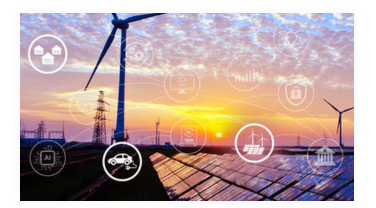Technology of Intelligent and Integrated Energy Systems free videos and free material uploaded by Delft University of Technology Staff .
Module 1: Grid Integration of Renewables You will learn how to integrate renewable energy sources into the electricity grid. Specifically:
Grid challenges and control for renewable integration into the grid
Power electronics for the integration of renewables
Ancillary services using renewables
Role of microgrids and multi-terminal HVDC
Industry perspective on Grid Integration of Renewables
Module 2: Energy Storage in the Integrated Energy System You will learn how to integrate intelligently and control energy storage and use demand side management. Specifically:
Importance of short- and long-term storage
Existing and future technologies for energy storage
Use of demand flexibility
Coordination of multiple storage resources
Power2X2Power (through hydrogen, ammonia, methane)
Industry perspective on Integrated Energy Storage
Module 3: Smart Charging and Integration of Electric You will learn how to use intelligence and integration in the transition to electric mobility and the crucial role of smart charging and vehicle-to-grid. Specifically:
Challenges and opportunities for integrating electric vehicles into the electricity grids
Smart charging of EVs, vehicle-to-grid (V2G) support and ancillary services
Well-to-wheel emission of electric vehicles
Solar charging of electric vehicles
Industry perspective on Smart Charging of EV
Module 4: Integration of Thermal Energy Systems You will learn about intelligent control and integration of thermal energy in the energy system. Specifically:
Trends and opportunities in sustainable heating
Thermal demand and thermal energy sources
Intelligent control of heat pumps
Thermal energy storage
Heating and cooling grids
Industry perspective on Sustainable District Heating Networks
Module 5: Multi-carrier Energy Grid Integration You will learn how to integrate different energy systems into one multi-carrier energy system. Specifically:
Intelligent planning and operation of multi-energy systems
Energy conversion technologies for multi-carrier systems
Modeling of multi-energy systems and model resolution
Using power-to-gas conversion for system support
Industry perspective on Integrated Energy System Planning
Module 6: Project on Designing an Integrated Energy System :
In this module, learners apply the knowledge they’ve gained on technology integration and its intelligent use to design their own energy systems for the future
This course will teach you how to design an integrated energy system considering various existing and up-and-coming technologies, such as renewable energy sources, energy storage, electric vehicles, thermal systems and interconnected multi-carrier grids, including natural gas and hydrogen. A special emphasis is placed on exploiting the synergies between different technologies in intelligent ways, to help the transition of the energy sector from fossil fuels to sustainable sources of energy. Intelligent operation and control are considered in this course as an essential part of the design. Learners apply the knowledge in an open-ended design project to see how they can use their newly gained skills to create a sustainable future for their city/neighborhood/ building.
This course has been developed by experts from TU Delft with decades of research experience and covers the key energy technologies and their synergies. The academic concepts are complemented with industry perspectives presented by guest experts from energy-related companies.
This course is aimed at professionals in the energy industry who want to broaden their perspective and discover the opportunities and benefits that accrue from synergies between different energy technologies and digital intelligence in an integrated energy system. Likely to benefit most are people in roles such as energy system designer, engineering project manager, power system planner, heating grid planner, system integration engineer, electric mobility infrastructure planner, etc. The key sectors to use this knowledge are grid operators, energy producers, energy suppliers, mobility system providers and operators, thermal system providers, energy technology startups and energy consultancy.

- 0 Reviews
- 1 Students
- 101 Courses

Write a public review